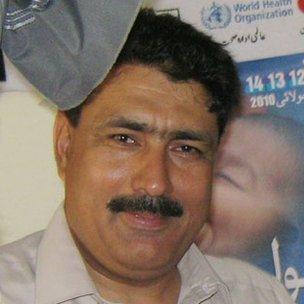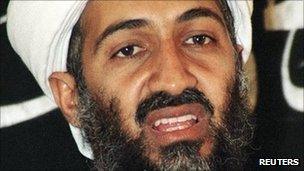Pakistan jails doctor who helped CIA find Bin Laden
- Published

Shakil Afridi could end up spending 33 years in prison
A Pakistani doctor who helped the CIA find Osama Bin Laden has been jailed for at least 30 years, officials say.
Shakil Afridi was charged with treason and tried under the tribal justice system for running a fake vaccination programme to gather information.
The US state department said there was "no basis" for the charges, but declined to make a specific comment on the doctor's sentence.
Bin Laden was killed by US forces in Abbottabad in May 2011.
The killing triggered a rift between the US and Pakistan, whose government was seriously embarrassed as it emerged Bin Laden had been living in Pakistan.
Islamabad felt the covert US operation was a violation of its sovereignty.
Absent from court
Shortly after the raid on Bin Laden's house, Dr Afridi was arrested for conspiring against the state of Pakistan.
Pakistan has insisted that any country would have done the same if it found one of its citizens working for a foreign spy agency.
Dr Afridi has been found guilty in Khyber district, and has also been fined $3,500. If he does not pay the fine his prison sentence will be extended by a further three years.
Under the tribal justice system, the administrative head of a tribal district performs the function of a judge.
Typically, this means a court will often deliver swift justice and does not necessarily follow the regular judicial procedures.
Dr Afridi, who is now being held in jail in Peshawar, was not present in court so was unable to give his side of the story.
State department spokeswoman Victoria Nuland told reporters on Wednesday: "We continue to see no basis for these charges, for him being held, for any of it."
US Secretary of State Hillary Clinton has called for his release on the grounds that his work served Pakistani and American interests.
The BBC's Aleem Maqbool in Islamabad says that many outside observers are concerned that most of the people detained since Bin Laden's killing have been those who were trying to help capture him, rather than those who helped shield him.
In June, Pakistani army officials told the BBC that some suspects were arrested for helping the Americans refuel their helicopters during the raid. Others were detained because they were suspected of firing flares to guide the helicopters towards the compound.
It is not clear if Dr Afridi knew who the target of the investigation was when the CIA recruited him, or what DNA he managed to collect in the fake hepatitis B vaccination programme.
The idea was to obtain a blood sample from one of the children living in the Abbottabad compound, so that DNA tests could determine whether or not they were relatives of Bin Laden, our correspondent says.
Both US Defence Secretary Leon Panetta and Secretary of State Hillary Clinton have said Dr Afridi's arrest was a mistake and called for his release.
Speaking in January, Mr Panetta said: "Dr Afridi was not in any way treasonous towards Pakistan. For them to take this kind of action against somebody who was helping to go after terrorism, I just think is a real mistake on their part."
The conviction of Shakil Afridi is likely to further strain US-Pakistan tensions, which have been rocky since the killing of Bin Laden, the BBC's Orla Guerin in Islamabad says.
More recently, the issue of drone strikes and Pakistan's refusal to re-open Nato supply routes to Afghanistan have made for a particularly uneasy relationship between the two allies, she says.

US special forces caught up with Bin Laden in a quiet Pakistani town last year
Pakistan's parliament has called for an end to the use of drones, and says they are an attack on its sovereignty. A drone strike on Wednesday killed four people in the North Waziristan tribal area, security officials said.
The two countries also failed to reach agreement at the Nato summit in Chicago over the supply routes that were closed after a US air strike in 2011 killed 24 Pakistani soldiers.
Islamabad is demanding more than $5,000 (£3,200) per lorry, up from its previous rate of $250, to let supplies flow again.